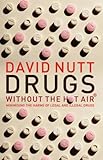Amongst the goodies from the book are this chart [2], which plots dependence risk against toxicologists' ratings of physical harm for various psychoactive substances. Nutt memorably compared the "20 drugs considered in the ISCD’s 2010 report, ranked by overall harm" with their legal Class and "found a correlation of 0.04 – which means that there was effectively no relationship at all."
Also: "Francis Crick, who discovered the double helix structure of DNA with James Watson, and Kary Mullis, who invented the polymerase chain reaction (PCR), had both taken [LSD], and attributed some of their understanding and insights to it."
[1] http://www.amazon.com/Drugs-Without-Hot-David-Nutt/dp/190686... Drugs Without the Hot Air: Minimising the Harms of Legal and Illegal Drugs by David Nutt
[2] http://upload.wikimedia.org/wikipedia/commons/9/9c/Rational_...
It's perhaps a little UK-centric, but I found it well argued and the author is eminently credible.
Professor Nutt "Why not?"
MP "Because one's illegal."
Professor Nutt "Why is it illegal?"
MP "Because it's harmful."
Professor Nutt "Don't we need to compare harms to determine if it should be illegal?"
MP "You can't compare harms from a legal activity with an illegal one."
http://www.amazon.com/Drugs-Without-Hot-David-Nutt/dp/190686...
http://www.amazon.com/Drugs-Without-Hot-David-Nutt/dp/190686...
edit: Economist review of said book: http://www.economist.com/node/21560223


Alcohol and cannabis are drugs. Tobacco and alcohol are more harmful than LSD, GSB or ecstasy [1][2].
> are neither fun nor novel nor especially risky from a legal point of view
Seriously? I've never taken LSD, but there are exactly zero accounts that characterise it as "neither fun nor novel."
Also, we're debating drugs' legality. Saying they're dangerous because they're illegal is tautological.
> just degenerate and debilitating
Amphetamines, opiates and tropane alkaloids have legitimate medical uses. And there are cultures with a long history of responsibly using them. I don't agree with OP in being overly permissive with their distribution; many people can't handle them, and until we can predict which people can't handle which drugs recreationally, due to neurochemistry or personality issues, I'm against broad legalisation.
But plenty of people–including extremely productive, society-improving people (e.g. Paul Erdõs [3])–used drugs, while plenty of sober people are useless and boring.
[1] https://www.amazon.com/Drugs-Without-Hot-David-Nutt/dp/19068...
[2] https://upload.wikimedia.org/wikipedia/commons/thumb/b/ba/De...
[3] https://en.wikipedia.org/wiki/Paul_Erdős